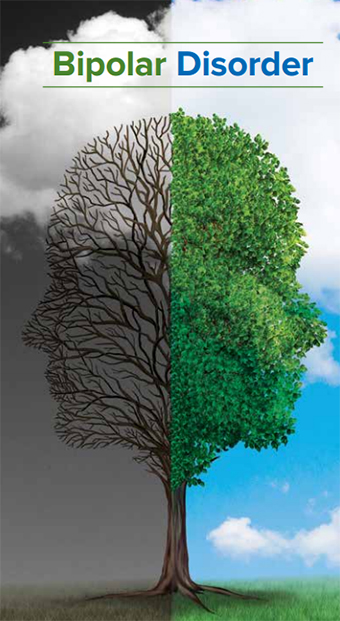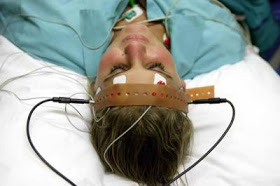Bipolar disorder
What is bipolar disorder? (Introduction )

Bipolar disorder is a serious brain illness. It is also called manic-depressive illness or manic depression. People with bipolar disorder go through unusual mood changes. Sometimes they feel very happy and “up,” and are much more energetic and active than usual. This is called a manic episode . Sometimes people with bipolar disorder feel very sad and “down,” have low energy, and are much less active. This is called depression or a depressive episode.
Bipolar disorder is not the same as the normal ups and downs everyone goes through. The mood swings are more extreme than that and are accompanied by changes in sleep, energy level, and the ability to think clearly. Bipolar symptoms are so strong that they can damage relationships and make it hard to go to school or keep a job. They can also be dangerous. Some people with bipolar disorder try to hurt themselves or attempt suicide.
Symptoms
The symptoms of bipolar disorder can vary between individuals as according to unlike mood swings ranging from high to low.
Mood: anger, anxiety, apathy, general discontent, guilt, hopelessness, loss of interest, loss of interest or pleasure in activities, mood swings, sadness, or elevated mood.
![]()
Behavioural: aggression, crying, excess desire for sex, hyperactivity, irritability, restlessness, or self-harm.
Psychological: agitated depression, depression, manic episode.
Sleep: difficulty falling asleep or excess sleepiness.

Cognitive: lack of concentration, racing thoughts, slowness in activity, or unwanted thoughts.
Weight: weight loss or weight gain.
Other common signs: fatigue, false belief of superiority, rapid and frenzied speaking, or risky behaviour.
Why does someone develop bipolar disorder? ( Causes)
Doctors do not know what causes bipolar disorder, but several things may contribute to the illness. Family genes may be one factor because bipolar disorder sometimes runs in families. However, it is important to know that just because someone in your family has bipolar disorder, it does not mean other members of the family will have it as well. Another factor that may lead to bipolar disorder is the brain structure or the brain function of the person with the disorder. Scientists are finding out more about the disorder by studying it. This research may help doctors do a better job of treating people. Also, this research may help doctors to predict whether a person will get bipolar disorder. One day, doctors may be able to prevent the illness in some people.
Biological difference:
People with bipolar disorder appear to have physical changes in their brain structure or the brain functioning. The significance of these changes is still uncertain but may eventually help pinpoint causes.
Genetics:

The chances of developing bipolar disorder are increased if a child’s parents or siblings have the disorder. Researchers are trying to find genes that may be involved in causing bipolar disorder.
Types of Bipolar disorder
Bipolar I
It is an illness in which people have experienced one or more episodes of mania. Most people diagnosed with bipolar I will have episodes of both mania and depression. A person will have had at least one manic episode which generally lasts at least 1 week, or less is the person is hospitalised Usually, depressive episodes occur as well, typically lasting at least 2 weeks. Some people may need to be hospitalised due to psychosis.
Bipolar II:
People experience depressive episodes shifting back and forth with hypomanic episodes, but never a full manic episode.
Cyclothymia:
It is a chronically unstable mood state in which people experience mild depression and hypomania for at least two years. People with cyclothymia may have brief periods of normal mood, but these periods last less than eight weeks. Most people only experience a month or two at a time where their moods are stable.
Rapid-cycling bipolar disorder:
This type of bipolar disorder causes faster changes in mood than other types of bipolar disorder. A person with this type may have four or more episodes of major depression, mania, hypomania, or mixed symptoms within a year.
Is bipolar disorder easy to diagnose?
No. Some people have bipolar disorder for years before the illness is diagnosed. This is because bipolar symptoms may seem like several different problems. Family and friends may notice the symptoms but not realize they are part of a bigger problem. A doctor may think the person has a different illness, like schizophrenia or depression.
People with bipolar disorder often have other health problems as well. This may make it hard for doctors to recognize the bipolar disorder. Examples of other illnesses include substance abuse, anxiety disorders, thyroid disease, heart disease, and obesity.
How is bipolar disorder treated? (Treatment )
People with bipolar disorder can get treatment. With help, they can get better and lead successful lives.
Right now, there is no cure for bipolar disorder, but treatment can help control symptoms. Most people can get help for mood changes and behavior problems. Steady, dependable treatment works better than treatment that starts and stops. Treatment options include:
- Medication. There are several types of medication that can help. People respond to medications in different ways, so the type of medication depends on the patient. Sometimes a person needs to try different medications to see which works best.

Medications can cause side effects. Patients should always tell their doctors about these problems. Also, patients should not stop taking a medication without a doctor’s help. Stopping medication suddenly can be dangerous, and it can make bipolar symptoms worse. - Therapy. Different kinds of psychotherapy, or “talk” therapy, can help people with bipolar disorder. Therapy can help them change their behavior and manage their lives. It can also help patients get along better with family and friends. Sometimes therapy includes family members.

- Other treatments. Some people do not get better with medication and therapy. These people may try electroconvulsive therapy, or ECT. This is sometimes called “shock” therapy. ECT provides a quick electric current that can sometimes correct problems in the brain.

- Self-management strategies and education.
Not every person will respond in the same way to medications, and some medications produce side-effects. Therefore, it is important to be under the care of a doctor for treatment.
Conclusion
Many people with bipolar disorder don’t realise they have a problem or avoid getting help. Hence if you think a friend or family member may have it, you may want to encourage them to talk with a doctor or mental health expert who can look into what’s going on. Try to talk to them to know what affects them and what they need. With your support, they may feel more connected and positively motivated.
National Institute of Mental Health (NIMH)
*weincluded.com *
Thanks for reading this and i hope you have learnt from that
Please, follow upvote and comment
Congratulations @ayedun001! You have completed some achievement on Steemit and have been rewarded with new badge(s) :
Click on any badge to view your own Board of Honor on SteemitBoard.
To support your work, I also upvoted your post!
For more information about SteemitBoard, click here
If you no longer want to receive notifications, reply to this comment with the word
STOP